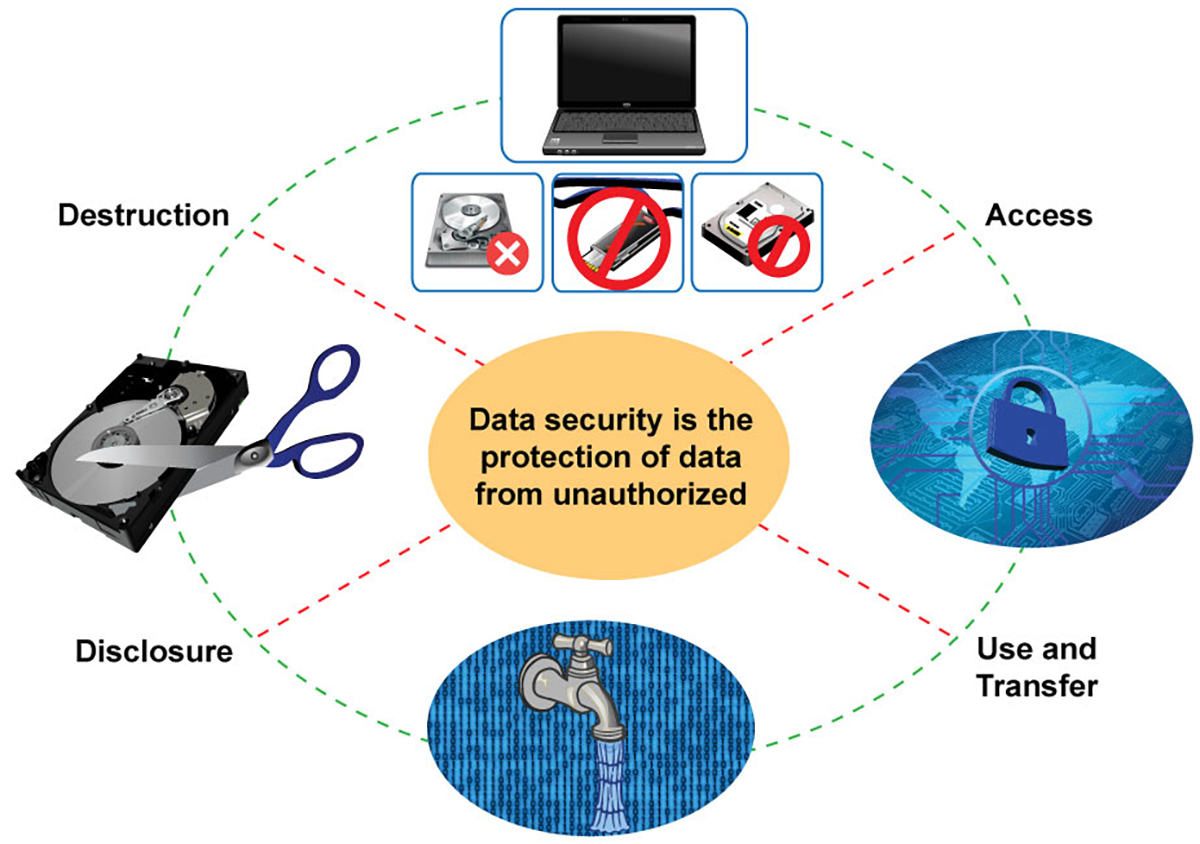Recognizing the Role of Data Destruction in Conditioning Cyber Security Defenses
Recognizing the Role of Data Destruction in Conditioning Cyber Security Defenses
Blog Article
Exploring the Value of Information Destruction in the Context of Computer System Security Solutions and Protecting Confidential Information
In an age where information violations are increasingly common, the relevance of reliable information devastation can not be overstated. When no longer required, Organizations needs to embrace rigid procedures to guarantee that sensitive details is not just protected throughout its lifecycle yet likewise decisively removed. The approaches used for data obliteration, paired with compliance to lawful criteria, play a crucial function in maintaining privacy and trust fund. The ramifications of these techniques extend past simple compliance, affecting a firm's reputation and operational stability in the electronic industry. What methods can companies carry out to enhance their data devastation procedures?
Comprehending Information Destruction
Data damage is a critical part of computer safety and security that involves the irreversible removal of data from storage space devices to avoid unauthorized accessibility and possible information violations. In a significantly digital landscape, organizations encounter enhanced dangers connected with sensitive information being incorrectly accessed or made use of. Effective information devastation safeguards against these threats, ensuring that personal dataâEUR" such as consumer info, copyright, and economic recordsâEUR" can not be recouped after disposal.
Understanding the significance of information destruction expands past simple compliance with governing and lawful frameworks; it is important for preserving business stability and trust. When data is improperly taken care of or inadequately damaged, the consequences can be serious, consisting of economic loss, reputational damages, and lawful liabilities.

Techniques of Information Obliteration

One common approach is information cleaning, which involves overwriting existing data with arbitrary patterns several times. This technique renders the original information irretrievable, making it a prominent choice for organizations seeking to protect private info.
Another method is degaussing, which utilizes an effective magnetic field to interfere with the magnetic domain names on storage gadgets, properly getting rid of the data. This approach is specifically effective for magnetic media however is not applicable to solid-state drives.
Physical damage is another robust approach, involving the shredding or squashing of storage space devices. This approach assurances that information healing is basically impossible, making it perfect for extremely sensitive info.
Finally, security can function as a corresponding approach to information elimination. By securing data before deletion, companies can include an added layer of security, ensuring that even if residues are recuperated, they stay unattainable without the decryption key. Each approach needs to be picked based upon the degree of information level of sensitivity and the particular security needs of the organization.
Legal Compliance and Data Safety And Security
Organizations must browse a complex landscape of lawful demands associated with information security, especially after applying approaches of data elimination. Different guidelines, such as the General Data Defense Learn More Here Law (GDPR) and the Health And Wellness Insurance Policy Transportability and Liability Act (HIPAA), enforce stringent guidelines basics on how organizations should get rid of and manage of sensitive information. Failing to follow these regulations can bring about significant lawful repercussions, consisting of substantial fines and reputational damage.
Information devastation processes have to be diligently documented to show conformity with suitable regulations and criteria. This documents not only acts as evidence of adherence to legal obligations yet additionally illustrates a commitment to guarding delicate info. Organizations should also develop clear policies concerning data retention and devastation timelines, guaranteeing that information is not held longer than needed.

Additionally, routine audits and evaluations of information damage techniques are vital to keep compliance and adapt to evolving legal structures (data destruction). By proactively addressing lawful requirements, companies can mitigate dangers connected with data violations and demonstrate their dedication to data safety and security. Ultimately, prioritizing lawful compliance in information destruction procedures is not simply a regulatory obligation, but an essential facet of a robust information security technique
Effect on Organization Online Reputation
The credibility of a business can be considerably affected by its strategy to information destruction and administration. In today's digital landscape, where information violations can happen anytime, the failure to effectively throw away sensitive details can result in severe repercussions. Organizations that inadequately take care of information devastation threat subjecting personal customer info, which not only goes against personal privacy regulations yet likewise wears down count on among customers and stakeholders.
A tarnished credibility can lead to reduced consumer commitment, as customers become hesitant to involve with a business that has actually shown negligence in protecting their data. Negative attention surrounding an information breach can have a lasting result, additional info as potential consumers may be deterred by the regarded absence of security. This can bring about a straight decline in earnings and market share.
Additionally, companies that prioritize information damage as component of their protection technique can enhance their reputation by showcasing their dedication to safeguarding sensitive details. By taking on rigorous information monitoring methods, organizations can not just reduce risks however also position themselves as reliable entities in their respective sectors, thereby enhancing their general brand name photo.

Finest Practices for Secure Disposal
Executing best practices for safe and secure disposal of information is vital for reducing risks connected with information breaches and guaranteeing compliance with personal privacy guidelines. Organizations must take on a detailed data disposal plan that describes procedures for both digital and physical information damage.
For physical information storage tools, such as hard disks, shredding or degaussing is recommended to stop information recovery. In addition, organizations should keep a chain of wardship paperwork during the disposal procedure, making certain accountability and traceability of disposed things.
For electronic information, using software that sticks to market criteria for information wiping is important. This software application ought to overwrite existing information numerous times, making recuperation basically impossible. It is additionally important to verify the efficiency of the information destruction process through audits or third-party evaluations.
Educating employees on safe disposal techniques includes another layer of safety and security, as human mistake can frequently result in information direct exposure. Consistently evaluating and updating disposal plans makes certain placement with evolving policies and technological improvements. By applying these ideal techniques, companies can dramatically reduce the risk of unauthorized information accessibility and boost their total data security approach.
Conclusion
To conclude, information damage is an essential facet of computer system safety services that ensures the defense of secret information from unapproved accessibility. Executing efficient approaches of data elimination, sticking to legal conformity, and identifying the effect on company credibility are vital components of a thorough data security approach. By embracing best techniques for safe disposal, organizations can cultivate depend on with clients and guard sensitive information, eventually adding to an extra protected electronic landscape.
In an era where information breaches are increasingly usual, the importance of reliable data devastation can not be overstated.Information destruction is a critical part of computer protection that involves the irreversible removal of information from storage tools to avoid unapproved access and possible data breaches. Organizations needs to also establish clear plans concerning data retention and devastation timelines, ensuring that information is not held longer than essential.
By proactively attending to legal demands, companies can reduce dangers linked with data breaches and show their commitment to information security (data destruction). Eventually, prioritizing legal conformity in data devastation procedures is not just a governing commitment, but a basic aspect of a robust data safety approach
Report this page